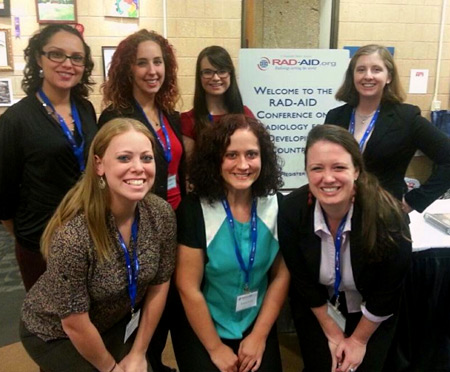Aug. 24, 2015
 While I was volunteering in my mid-20s, I met a woman who led me to an important realization.
While I was volunteering in my mid-20s, I met a woman who led me to an important realization.
The woman was homeless and the mother of a newborn. She was trying to get back on her feet without the support of her family. Meeting her, I could not help but reflect on my own supportive husband and parents and the educational and professional opportunities I had experienced. In that moment, I was struck by the fact that there was no difference between us except that I happened to be born into a life that provided me with more support and opportunities.
The experience made me realize it is my duty to use the gifts I have been given to help others, including those working in medical imaging who do not have access to the technology and education available in the United States.
After developing a lecture series with a focus on global radiology health, I helped start the University of North Carolina chapter of RAD-AID International, a nonprofit organization that promotes sustainable radiology outreach initiatives around the world. I now serve as the vice president of operations for RAD-AID International and director of the organization’s Radiologic Technologist Program.
RAD-AID Malawi
In 2013, my chapter of RAD-AID began working on the RAD-AID Malawi program, an ongoing project that sends teams of medical imaging professionals and students to Lilongwe, Malawi, to promote sustainable radiology educational initiatives. The ASRT Foundation’s R.T. Fellowship Program was instrumental in my chapter’s ability to establish the project. I am grateful that the Foundation believed in what we were trying to accomplish with that initial trip to Malawi.
Since the program started, we have sent five teams to Malawi. The program’s goals focus on the work of technologists and radiologists. A focus on biomedical engineering is in development now because equipment repair is a significant challenge.
The program’s long-term partnership in Malawi is making a difference by tackling one objective at a time. So far, the program has accomplished the following objectives:
• Consulting with the Malawi Ministry of Health to help develop a national radiology policy that will be implemented throughout the country.
• Working with Malawian technologists from Kamuzu Central Hospital and the Malawi College of Health Sciences Radiography Programme to develop a baccalaureate radiography curriculum. The Ministry of Health adopted and plans to implement the curriculum.
• Sharing educational materials and imaging techniques.
• Presenting guest lectures on requested topics at the Malawi College of Health Sciences Radiography Programme, the only program in the nation for student technologists.
• Acting as a resource to Malawian students by answering questions via email following the program’s in-person visits to Malawi.
Volunteer Efforts in Nepal
ASRT Foundation support doesn’t extend only to RAD-AID efforts in creating lasting partnerships in low-resource countries. It also enables organizations like RAD-AID to respond to emergency needs quickly, such as the recent devastating earthquake in Nepal.
In partnership with the ASRT Foundation, RAD-AID International sent a team to Nepal to provide immediate relief efforts and to establish reconstruction and education goals. The Foundation matched donor funds to send a team of medical imaging professionals to six hospitals there to provide technical clinical support and emergency services after the earthquake destroyed many of the hospitals. RAD-AID efforts in Nepal are ongoing.
Outreach and Growth
It’s not where you volunteer that makes a difference to the profession. What is important is the fact that you volunteer, whether that activity takes place internationally, within professional organizations at the state and national level, or right within your own office.
The realization that struck me when I was volunteering in my 20s is what motivated me to volunteer with RAD-AID. Since then, I have learned that I gain as much, if not more, from my work with RAD-AID as do my colleagues in Malawi.
My perspective has changed. What typically might be considered a radiology outreach effort, I now consider a bilateral partnership with colleagues. I have come to find that the outreach and growth involved with volunteering goes both ways.
This article was originally published in ASRT Scanner, Vol. 47, No. 6, Page 20. Melissa Culp is an instructor at the University of North Carolina-Chapel Hill in the School of Medicine’s Department of Allied Health Sciences, Division of Radiologic Sciences. She is the program manager for RAD-AID Malawi and an ASRT delegate for the North Carolina Society of Radiologic Technologists. Melissa joined the ASRT in 2006 and is a member of the Education and Magnetic Resonance chapters.